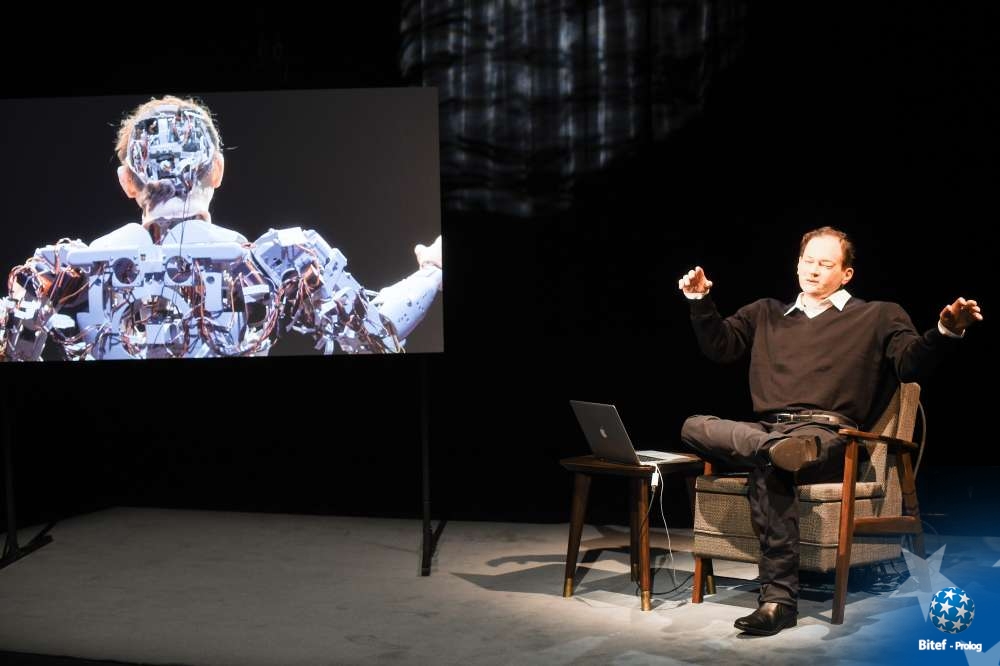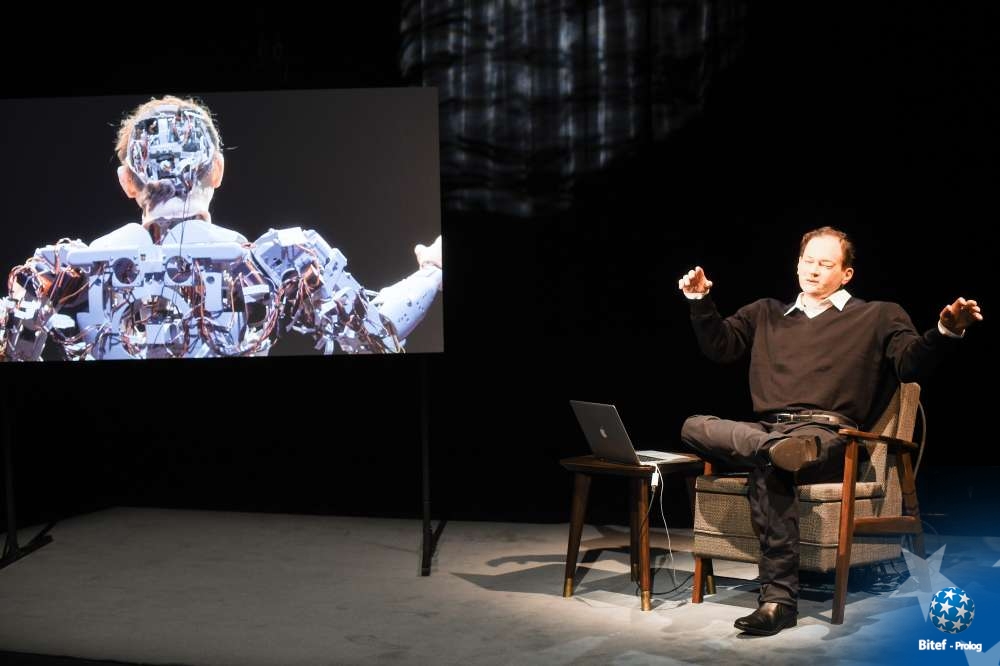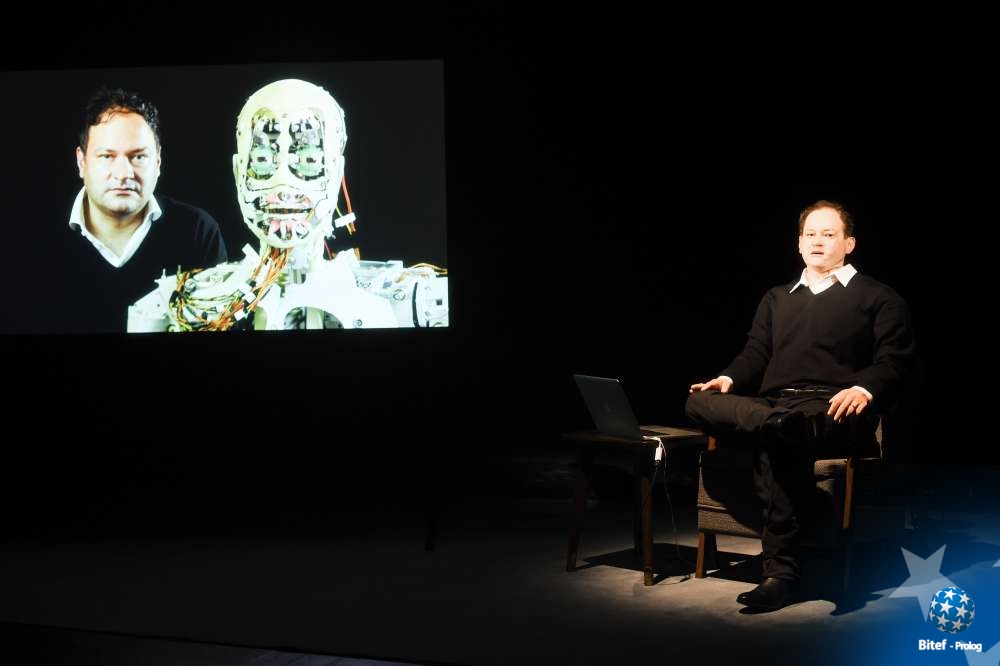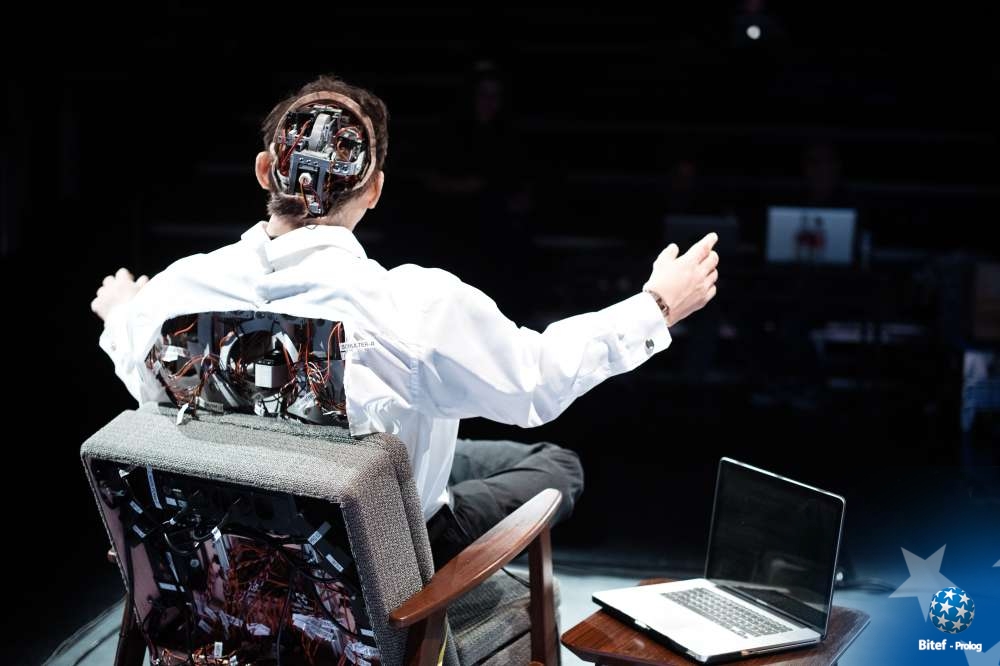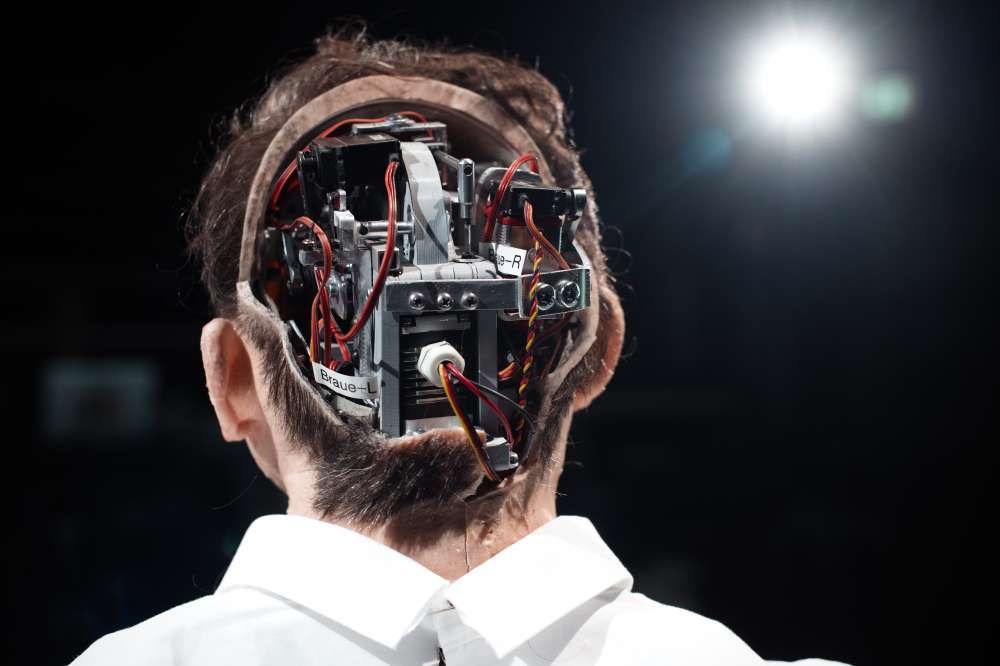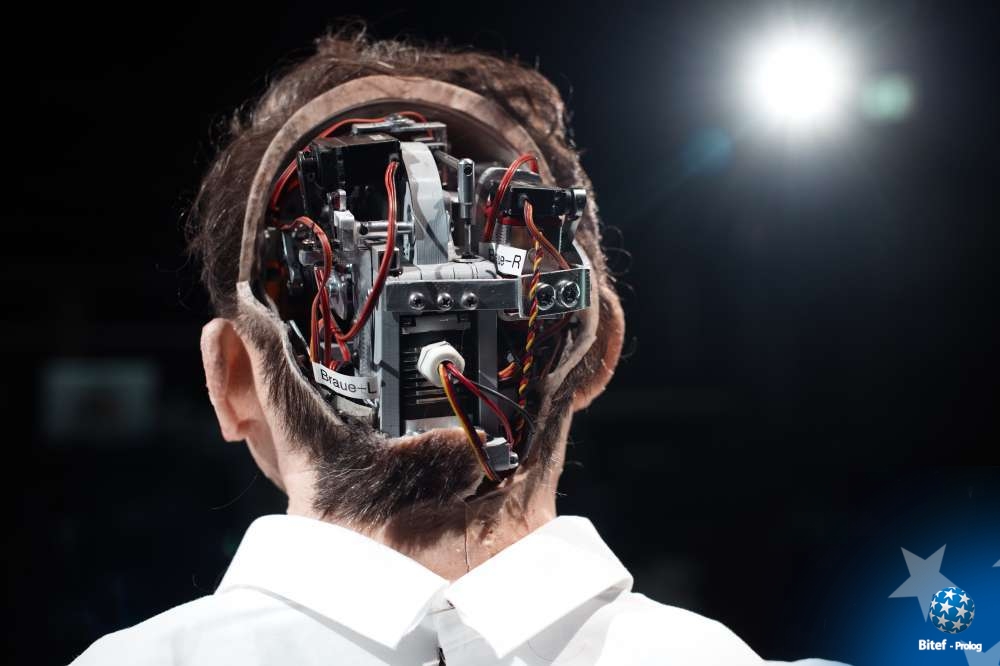About The Production
We mostly think of robots as work machines, as efficient and precise executors of tasks. In German industry, they barely look like people, to avoid emotional complications. Unlike in Asia, where humanoid robots have already been developed for some time, for example for care-work or as sex partners. The external similarity to human beings makes the acceptance of machines easier. However, if the machine is too similar to a human, we begin to feel mistrust: what is human, what is machine? Japanese robotics researchers call this weird similarity the “uncanny valley”.
For his new play, Stefan Kaegi works with a writer and playwright for the first time: Thomas Melle allowed an animatronic double of himself to be made. This humanoid takes the author’s place and throws up questions: what does it mean for the original when the copy takes over? Does the original get to know himself better through his electronic double? Do the copy and his original compete, or do they help each other?
The Authors
STEFAN KAEGI produces documentary theatre plays, radio shows, and works in the urban environment in a diverse variety of collaborative partnerships. Using research, public auditions and conceptual processes, he gives voice to ‘experts’ who are not trained actors but have something to tell. This is how he directed Mnemopark, a model railway world in the Basel Theatre - a live film (set in 1:87 scale) that has been shown in over thirty cities between Tokyo and Montreal. Kaegi has toured across Europe and Asia for over three years with two Bulgarian lorry drivers and a lorry converted into a mobile audience room (Cargo Sofia). In 2008, he developed “Radio Muezzin” in Cairo - a project about the call to prayer in our age of technical reproduction, and in 2011, “Bodenprobe Kasachstan” about migration and oil in central Asia. At the moment, he is touring with Remote X, a modular site-specific audio-tour for hordes of 50 listeners, which included Belgrade during 53rd Bitef. In 2010, Kaegi was awarded the European Prize for Cultural Diversity. In 2011, Kaegi curated the “Idiom”- section of the Malta Festival Póznan. Kaegi co-produces works with Helgard Haug and Daniel Wetzel, under the label “Rimini Protokoll”. Rimini Protokoll’s purpose is to pry apart the sense of reality and present all its facets from unusual perspectives. Rimini Protokoll was awarded the Faust Theatre Prize in 2007, the European Prize for New Theatre Forms in 2008 and in 2011 the silver lion of the Biennale for Performing Arts in Venice. The multi-player video-installation Situation Rooms about the weapons-industry got the Excellence award at the 17th Japan Media Festival. In 2015, Stefan Kaegi has received the Swiss Grand Award for Theatre / Hans Reinhart Ring.
At 52nd Bitef 2018, performance Nachlass, pièces sans personnes, based on the concept by Stefan Kaegi, and produced by Théâtre Vidy-Lausanne, won Grand Prix “Mira Trailović” and Politika Award.
THOMAS MELLE studied comparative literature and philosophy in Tübingen, Austin, Texas and Berlin. In 2004 he made his debut as a playwright with 4 Million Doors (written together with Martin Heckmanns). In 2007 the short story collection Raumforderung for which he received the Young Writers' Prize of the Bremen Prize for Literature in 2008. His debut novel Sickster (2011) was awarded the Franz Hessel Prize. His novel 3000 Euro followed in 2014, which was shortlisted for the German Book Prize. In 2015, Thomas Melle, who lives in Berlin, received the Berlin Art Prize. In the following year, he was shortlisted for the German Book Prize for Die Welt im Rücken (The World at Your Back, 2016). In this book Melle offers an extraordinary insight into the live and the reasoning of a person suffering from manic depression. It was awarded the Klopstock Prize for New Literature and received the recognition by the Schiller Foundation. The stage adaptation of the dramatized novel at the Vienna Burgtheater (directed by Jan Bosse) with Joachim Meyerhoff as the protagonist was selected for the Berlin Theatertreffen in 2018. Thomas Melle has been nominated for the Mülheimer Dramatikerpreis two times: in 2016 for Bilder von Uns and in 2018 for Transfer. For Uncanny Valley, a doppelgänger of Thomas Melle was made. The writer’s face and hands were copied and his body measured. Thomas Melle wrote the text for Uncanny Valley together with the director Stefan Kaegi.
From the Reviews
"The text alternates so cleverly between Doppelgänger-motifs and achievements in information technology, external determination and self-empowerment, truthfulness and dizziness that some viewers probably felt a bit nauseous. After the final applause, they stand around the machine, like amazed children. Not only to compare the repertoire of movements and servomotor, but also to calm down that the next step in evolution, the mingling of man and machine, should be a while away."
Hendrik Werner, Weser-Kurier
"This unforgettable evening, first a monologue, then a later dialogue between canvas-Melle and Mascinen-Melle, is a game with reality and thus touches on the basic theme of the theater. How artificial can theater be? Or, in other words, in the classic sense: "To be or not to be, that is the question".
Isabelle Hofmann, kultur-port.de
"The text is about the hopes and joys and fears of becoming cyborgs or of replacing people, a fascinating topic for philosophers, theologians, psychiatrists and for everyone. In addition, the idea of the art man has pervaded our world forever, from the music boxes to Leone and Lena (who pretend to be automatons), E.T.A. Hoffmann's reared Olimpia and Dorian Gray to the robots and androids of artificial intelligence; from Goetz von Berlichingen's iron hand to the heart of art, from kafka's report for an academy (the monkey as a thinking person) to Duane Hanson's museum people made of glass fiber, John De Andreas hyper-realistic naked women and the real-life silicone ladies."
Michael Skasa, Die Zeit
"Everything takes place within a rictus grin, formed through the wrinkling of silicon on the android, or during one of its diabolical silences and stares into emptiness. His ability to manipulate us, although a result of precise programming, almost reverses the balance of power at work: is machine still a mechanism that makes us complete, or is man a sensitive organism that gives it life?"
Thomas Corlin, Libération
